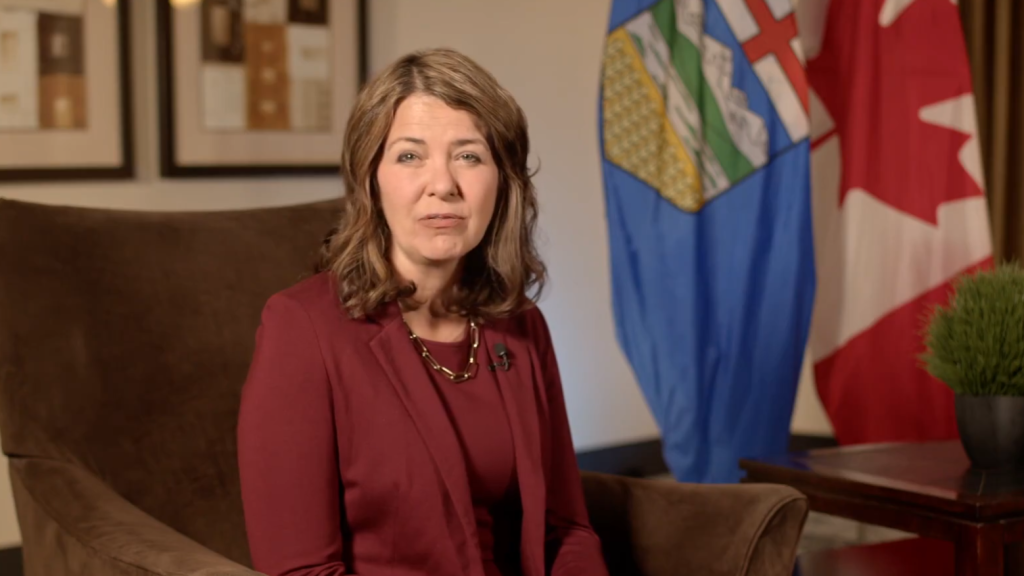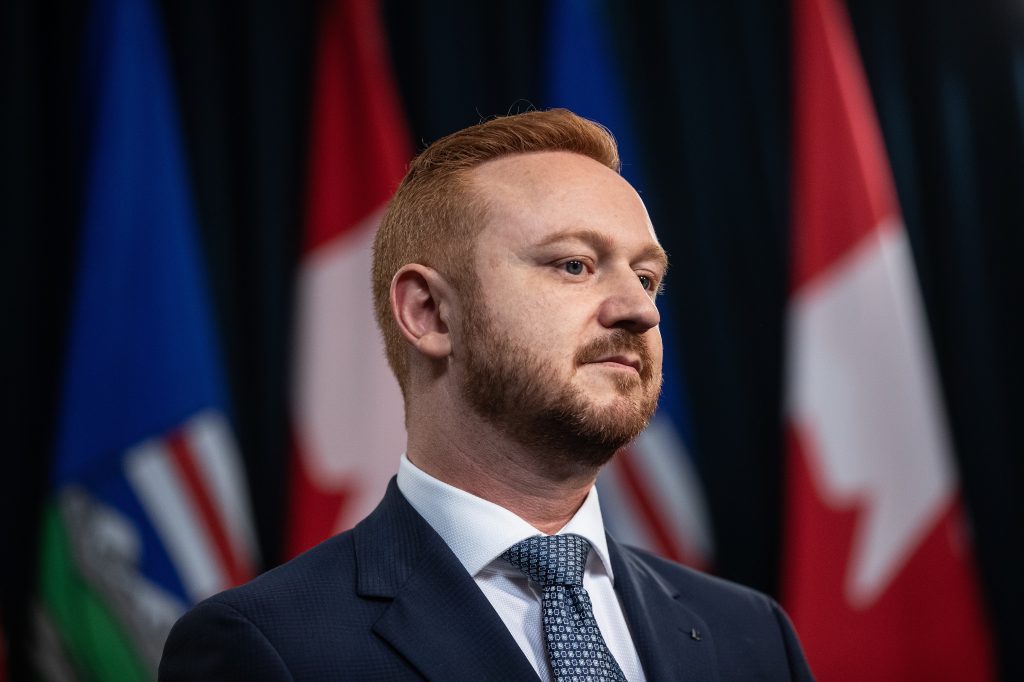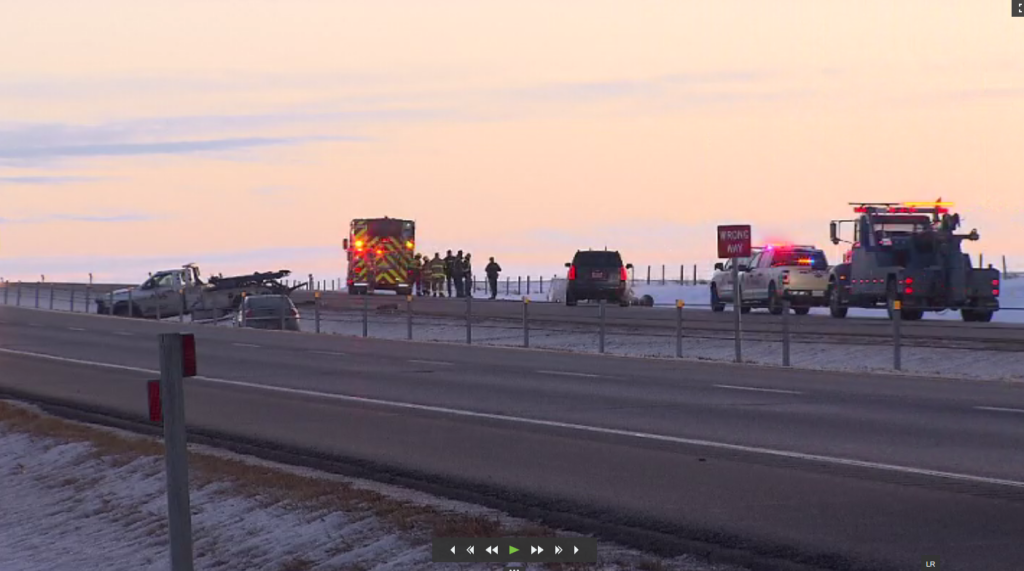Alberta introduces bills impacting sex ed, pronouns, gender affirming care for trans youth

Posted Oct 31, 2024 7:28 am.
Last Updated Oct 31, 2024 6:22 pm.
Contentious legislation regulating sex education, pronouns, trans women and girls’ participation in sports, and gender affirming care for trans youth was tabled in the Alberta Legislature Thursday.
Premier Danielle Smith’s UCP government has proposed a bill that would require children under 16 to have parental consent if they want to change their names or pronouns at school.
Another bill would prohibit doctors from treating those under 16 seeking transgender treatments.
A third bill would ban transgender athletes from competing in female amateur sports and require school and sports organizations to report eligibility complaints.
Legislation impacting transgender youth
The new legislation would impose sweeping restrictions on transgender youth in Alberta.
Proposed amendments to the Health Professions Act would ban health professionals — doctors, nurses and nurse practitioners, surgeons, and pharmacists — from performing sex reassignment surgeries on minors or providing them with puberty blockers and hormone therapy.
Exceptions will be made for those who have already started treatment, according to the province. Sixteen and 17-year-olds will be able to start puberty blockers and hormone therapy with parental, physician, and psychologist approval.
Provincial officials confirmed bottom surgery isn’t currently performed in Alberta, and that top surgery is “rare.”
Healthcare professionals who don’t follow the proposed law would be subject to discipline under the Health Professions Act, which allows employees in healthcare fields to be policed by self-governing regulatory colleges.
Organizations that advocate for 2SLGBTQ+ youth and adults have sounded the alarm on the potentially devastating impacts of this legislation.
A peer-reviewed study published in Nature Magazine shows in the first year after anti-transgender laws were enacted in 19 different U.S. states, there were statistically significant increases in rates of suicide attempts among transgender and non-binary people.
Canada’s Minister of Health, Mark Holland, and Minister for Gender Equality, Marci Ien. have previously expressed concern, saying health-care decisions, including gender affirming care, should be made between families and their doctors.
Sex education and pronoun use in schools
Alberta parents would have to opt-in for their child to receive sexual education in school under a law proposed by the governing United Conservatives.
If passed, changes to the Education Act would give the Minister of Education the power to approve learning and teaching resources, and external presenters for topics that primarily and explicitly deal with gender identity, sexual orientation, or human sexuality.
Educators would need to notify parents 30 days in advance of the planned instruction to be given the opportunity to opt-in
The government claims 250 stakeholder, including stakeholders, parents, and teacher representatives, superintendents, and mental health organizations were consulted when considering this change.
Schools would also be required to notify parents and obtain consent if their child younger than 15 asks a school staffer refer to them by a new name or pronouns at school. Students aged 16 and 17 who ask to be referred to with a different name or pronoun at school will have to have their parents notified, but don’t need their consent.
School sex ed and pronoun legislation would come into effect on Sept. 1, 2025 if passed.
Alberta Teachers Association president Jason Schilling has expressed concerned about opt-in policy, say it could have students missing out on valuable information at a time when Alberta is experiencing high rates of sexually transmitted infections (STIs).
Preliminary data from the province says cases of gonorrhea ticked up to 1,334 in the first quarter of 2024 from 1,247 in the same period of 2022. Chlamydia also went up to 4,234 cases from 4,030.
Participation of trans women and girls in sport
The province is also proposing a new law called the Fairness and Safety Support Act, which would ban transgender women from participating in female sport, including amateur competitive sport, college and university athletics and independent academic institution leagues.
These organizations will also be required to create athlete eligibility polices for the sports they deliver and support the creation of co-ed divisions which transgender athletes would be allowed to participate in.
When it comes to enforcing the law, the province says eligibility would be determined based on the gender marker on an athlete’s birth certificate.
Albertans are presently allowed to change the gender marker on their birth certificate. Smith says there are no plans to change that.
Rules around eligibility for sport are anticipated to come into effect in the fall of 2025, if the bill is passed.
Criticism, questions raised
Many organizations have condemned the policies, including Amnesty International Canada, the Canadian Association for Elizabeth Fry Societies, the Canadian Centre for Policy Alternatives and Pride societies across the province.
Victoria Bucholtz, a transgender woman and member of the group Queer Citizens United, said Smith and her UCP government have not listened to the transgender and queer community, only a fringe minority.
The easiest way for Smith to depoliticize the policies would be to do nothing, Bucholtz said.
“Abandon these policies and turn this back over to parents, teachers and health-care professionals who deal with the trans community,” said Bucholtz. “This video shows … that she is aware that there’s a huge amount of opposition to what she’s doing.”
Alberta Opposition NDP Leader Naheed Nenshi reacted to the legislation in Edmonton on Thursday afternoon, calling the government “callous.”
“It really shows you how little they care about the impacts of their careless rhetoric, and careless action on real people.”
Support available
Youth and young adults can call or text Kids Help Phone for 24-7 support, information, and referrals to services.
Several supports are also available for 2SLGBTQ+ youth in Alberta through the Canadian Mental Health Association.
In Calgary, Skipping Stone offers various resources for trans and gender diverse youth, adults, and families who require support.
-With files from The Canadian Press








